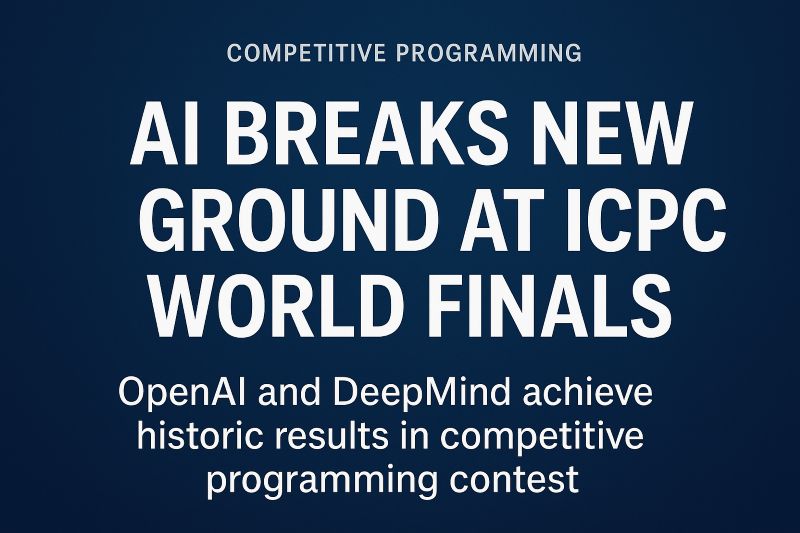AI Makes History at ICPC World Finals: OpenAI and DeepMind Stun the World
Introduction: A New Chapter in Competitive Programming
The International Collegiate Programming Contest (ICPC) is often called the “Olympics of programming.” It brings together the brightest student programmers from top universities worldwide. These teams compete to solve very difficult algorithm problems within five hours.
This year, something extraordinary happened. For the first time, advanced artificial intelligence systems from Google DeepMind and OpenAI were tested on the same ICPC World Finals problems. The results were beyond imagination and have set a new milestone in the world of technology.
What is ICPC and Why It Matters
ICPC is not an ordinary contest. It tests:
-
Algorithm design – creating clever solutions to complex challenges.
-
Data structures – using memory and processing efficiently.
-
Logic and creativity – finding new ways to solve problems quickly.
Teams of three students share one computer. They face 12 hard problems and must solve them as fast and accurately as possible. The competition is known for its intensity, pressure, and extremely high level of difficulty. Winning ICPC is like winning the world cup of coding.
DeepMind’s Gemini 2.5: A Golden Achievement
Google DeepMind entered the contest with its model Gemini 2.5 Deep Think. The system managed to solve 10 out of 12 problems in the finals. This placed it at a gold-medal level, similar to the best-performing human teams.
The most surprising part? Gemini solved one problem that no human team in the competition could solve. This shows how AI can sometimes see solutions differently and go beyond human limits.
This achievement alone would have been headline news. But the story did not end there.
OpenAI’s Perfect Score: A First in History
OpenAI’s AI system went even further. It solved all 12 problems within the 5-hour contest window. That means a perfect score—something even the best human teams rarely achieve.
-
Out of the 12 problems, 11 were solved on the very first attempt.
-
The final, most difficult problem took multiple tries, but the AI succeeded.
-
The best human team in the same contest solved 11 problems, one short of perfection.
This means that, if officially counted, OpenAI’s AI would have ranked first place at ICPC 2025.
Why This is So Important
Solving ICPC problems is not just about writing code. It requires:
-
Fast logical reasoning
-
Abstract thinking
-
Designing algorithms under pressure
-
Working within strict time limits
For years, people believed only humans could perform at this level. AI models could help with coding, but full contest-level problem solving seemed out of reach.
Now, both DeepMind and OpenAI have shown that AI can not only match humans but, in some cases, surpass them.
Human Teams vs. AI Performance
This year, 139 human teams competed in the finals. The very best of them solved 11 problems. That is an incredible achievement by itself. But compared to OpenAI’s perfect 12, it shows how far AI reasoning has advanced.
DeepMind’s 10 problems solved also matched the level of gold-medal human teams. But what really stood out was that unique problem solved only by Gemini, proving AI can offer new approaches to problems humans find impossible.
The Bigger Picture: Beyond the Contest
This moment is bigger than a competition. It opens up new discussions:
-
Education: How will programming contests evolve if AI can outperform humans?
-
Workplace: Will AI become a co-pilot for coders, solving complex tasks in seconds?
-
Fairness: Should AI be allowed in contests built for human students?
-
Innovation: What new fields can benefit from AI’s problem-solving skills?
AI models are already being used in classrooms, research, and businesses. With this performance, it’s clear they can also become powerful tools in teaching, training, and innovation.
Limitations and Challenges
Even with such success, there are limits:
-
Controlled testing – The AI did not directly “compete” in the event but was tested under the same contest conditions.
-
Computing power – AI requires far more resources than humans to run these solutions.
-
Generalization – Solving ICPC problems does not mean AI can instantly solve every real-world problem.
Still, this achievement is a massive leap forward in AI research.
What the Future Holds
Looking ahead, we can expect:
-
More AI models tested in global contests.
-
New training methods where students use AI as mentors.
-
A shift in how “problem-solving” is defined in the age of AI.
Humans will not be replaced, but the way we work with AI will change everything.
Conclusion: A Milestone Moment
The ICPC World Finals 2025 will be remembered as the year AI reached human-level competitive programming—and then went beyond it.
-
DeepMind’s Gemini 2.5 achieved gold-medal status and solved a unique problem.
-
OpenAI’s system achieved the first perfect score in history with all 12 problems solved.
For the programming world, this is a turning point. AI has shown it can think, reason, and create at a level once believed to be uniquely human. The future of coding, learning, and innovation will never be the same.


